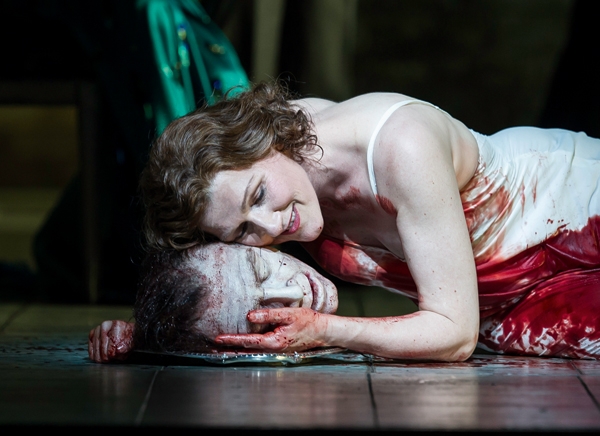It struck me for the first time at the latest revival of David McVicar’s production of Richard Strauss’s Salome that this opera, Strauss’s first to maintain a place in the repertory, and its successor Elektra are, for all their differences, companion pieces. Even before reading the late Patrick O’Connor’s excellent article ‘Happy Families’, the best and least pretentious in the programme book, I’d been reflecting on how the two operas deal with the classic issue of the powerful and disturbing relationship between father and daughter: in the case of Salome, it is a stepfather in love with his stepdaughter, but that hardly alters the point; while in Elektra it is a daughter obsessed with her father.
The two texts are of course very different in tone. Wilde’s translated into German is a mixture of wilful decadence, uncertain giggles and absurdly pretentious verbal gesturing (‘The mystery of Love is greater than the mystery of Death’ is an uncharacteristically abstract thought coming from Salome on the home stretch); while Hofmannsthal’s version of Sophocles’ play is fastidiously tragic, with suffocating undertones of Freud’s couch. Strauss, who found it hard to keep his mischievousness at bay (his most attractive quality), has a ball with Salome, and produces a comic satire of the utmost brilliance; while, in my view, the tragic satire of Elektra sinks under the weight of its earnestness, leaving one bludgeoned by its sheer volume.
It is a virtue of this revival, directed by Bárbara Lluch, that it is almost always straight-faced, not going out of its way, for instance, to insist that Salome is the hapless victim of a corrupt society. The corrupt society is there, if you aren’t in the amphitheatre, where it can’t be seen: high up there is a sumptuous dinner party in progress as the curtain rises to that teasing, menacing clarinet flourish, all there is by way of prelude. At ground level, where the production previously had many slaves doing McVicarish things, there is now not a lot going on: soldiers standing round, a naked woman seated, but it is much calmer than it was. That enables us to concentrate on the music, and so we should, for Andris Nelsons conducts an account of the work that is by far the finest I have ever been present at, and rivals Clemens Krauss and Fritz Reiner. Though Strauss’s scoring here is less nonsensically dense than it soon became, it can still sound cluttered, but Nelsons achieved lucidity at every moment, while shaping the whole so that its undeniable longueurs — almost every episode is overlong, with wearisome lists of precious stones and birds, all the Nineties stand-bys — nonetheless do lead towards the twin climaxes of Salome’s dance and her sensational final monologue.
Angela Denoke reprises the title role, and with more volume and warmth than she could muster in 2010. She looks like a distraught society hostess in an early Coward play, but she is suitably slinky and makes a fitting daughter for the Herodias of Rosalind Plowright, who was in great voice, and is more attractive and imperious than ever. Jokanaan is the great Latvian bass Egils Silins, whose qualities we in England are belatedly discovering. He boomed his hollow music to great effect, and let Salome grope him at unusual length. His decapitated head bore no resemblance whatever to how it had looked in its preferred location, but Salome gave it ardent attention, doing her utmost to prise open the closed eyelids, and throwing it down the stairs in a fit of pique before she re-embraced it for her ultimate caresses. Stig Andersen was a reasonable Herod, and Will Hartmann was the luxuriously cast Narraboth, the opera’s most sympathetic character.
The Guildhall School of Music and Drama, always enterprising, put on Ned Rorem’s Our Town, his version of Thornton Wilder’s celebrated play. It was staged in the round, which meant that, though one was agreeably close to the singers, when they turned away they became nearly inaudible. There were three big screens aloft, but they showed rural scenes and folksy messages, where they could have been useful for surtitles. The evening I went, Sky Ingram, an actress and singer of enormous promise, had finally succumbed to a virus, so she acted while Lucy Hall sang her part, admirably, from the pit. In a production where mime dominated, this was an unwanted extra.
This piece, about a rural American community in the early years of the 20th century, had the characters dressed appropriately, but apart from some of them eating a solid meal, everything, wedding ring and all, was mimed. The first two acts are very straightforward, with a Stage Manager to explain things; the last becomes more metaphysical in Wilder’s annoying way, and the music changes character. But it’s hard to claim that it ever has much. I was reminded too often of Copland, and when I watched the movie that was made of the play on the following day (it’s on YouTube complete) I was more moved. But the Guildhall performance was virtually flawless, exactly the kind of thing it should do.






Comments